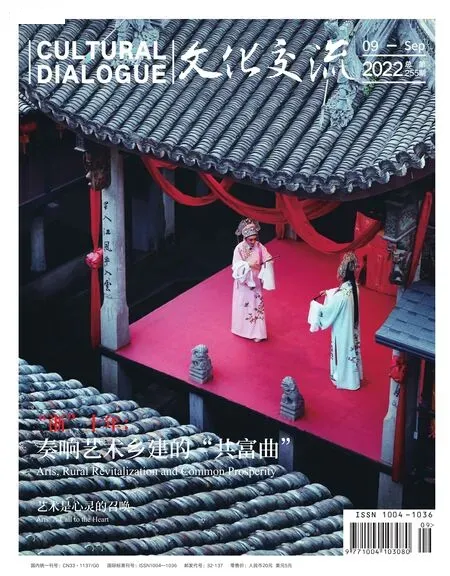杭州不是东坡肉发明地
2022-09-26司马一民
文/司马一民
东坡肉是杭州的一道传统名菜,可谓家喻户晓。杭州大大小小做杭帮菜的餐馆里,东坡肉是必备的菜之一,也是杭州人招待外地客人的必选菜之一。
如果我告诉你,东坡肉发明地不在杭州,你信不信?
宋神宗元丰三年(1080年)二月,苏东坡被贬到黄州任团练副使,一家人生活困苦,他率家人在城东坡地开荒种地,自号“东坡居士”。当时的黄州,有钱人喜欢吃羊肉而不屑于吃猪肉,老百姓又不知道猪肉怎么做好吃,苏东坡就研制出了独门的“东坡肉”,既改善了自家的生活,又给黄州百姓创造了一道美味佳肴。苏轼还专门写了一首《食猪肉》诗,算是烹饪纪实吧。
这首诗的大意为:把锅子洗得干干净净,放入切块的猪肉,少放水,燃上柴木、杂草,抑制火势,用不冒火苗的虚火来煨炖。等待它自己慢慢地熟,不要用旺火催熟它,煨炖的时间够足,它自然会滋味极美。黄州有这样好的猪肉,价钱贱得像泥土一样;富贵人家不肯吃,贫困人家又不会煮。我早上起来打上两碗,自己吃饱了您莫要理会。
这几乎与菜谱差不多了。
以苏东坡的名气,以及他在黄州与百姓的交往,这道菜广为传播、仿效,完全有可能。据传,黄州百姓把这道菜称为“东坡肉”。
不过,东坡肉真正被叫响并闻名全国的起始却是在杭州。
宋哲宗元祐四年(1089年)一月,苏东坡来到阔别十五年的杭州任知州。四月二十九日,苏东坡在上奏朝廷的《乞开杭州西湖状》中说:“熙宁中,臣通判本州,则湖之葑合盖十二三耳。至今才十六七年之间,遂堙塞其半。父老皆言十年以来,水浅葑横,如云翳空,倏忽便满,更二十年,无西湖矣。使杭州而无西湖,如人去其眉目,岂复为人乎?”
紧接着,他在奏章中列出了疏浚西湖的五条理由:保障市民饮用水,农田灌溉,生态保护,疏浚河道,保护官营酿酒业发展(朝廷重要的税收来源)。朝廷同意了苏东坡的奏请,他组织民工疏浚西湖,使西湖旧貌变新颜,达到了上述五个目标。

东坡肉。The Dongpo Pork.
至于在疏浚西湖的过程中,利用挖出的葑泥构筑长堤,南起南屏山麓,北到栖霞岭下,全长近三公里,连接了西湖南山与北山,给西湖增添了一道亮丽的风景线,那完全是疏浚西湖的“副产品”,只能说明苏东坡才情丰富、心胸旷达,特别善于治理城市。
据传,杭州的老百姓很感谢苏东坡为杭州做的这件好事,都夸他是个贤明的父母官。听说他在黄州时最喜欢吃猪肉(其实是吃不起羊肉),于是到过年的时候,大家就抬着猪肉挑着酒担去给他拜年。苏东坡收到后,便指导家人将肉切成方块,加入酒和佐料,炖得酥酥的,然后分送给参加疏浚西湖的民工们吃,大家吃后无不称奇,就这样一传十十传百,在杭州城里传开了。有个精明的杭帮菜餐馆老板,也做了这道菜,并且取名“东坡肉”,很受客人青睐,生意出奇的好,其他杭帮菜餐馆也纷纷做起了东坡肉。南来北往的客人到杭州,杭帮菜餐馆都会向他们推荐东坡肉,东坡肉渐渐名满天下,成为杭州传统名菜中的第一。
再来说几句苏东坡与烹饪的趣事。苏东坡一家在黄州的日子比较艰难,他写了一篇《节饮食说》贴在墙上自勉:“东坡居士自今日以往,早晚饮食,不过一爵一肉。有尊客盛馔则三之,可损不可增。有召我者,预以此告之,主人不从而过是,乃止。一曰安分以养福。二曰宽胃以养气。三曰省费以养财。”
虽然生活困苦,但苏东坡善于苦中作乐,这位天才的美食家总有办法就地取材,做一些美味给家人改善一下伙食。他做的东坡羹,吃过的人都觉得味道十分鲜美,纷纷向他请教。为此,苏东坡写了一篇《东坡羹颂》,详述做法。
此文大意为:将大白菜、大头菜、大萝卜、野荠菜反复揉洗干净,意在除去菜蔬中的苦汁儿;用少许生油涂抹在大锅四壁、大瓷碗上;将切碎的白菜、萝卜、荠菜及少许生姜放入锅中煮菜羹,用油碗覆盖但不触碰菜羹,不然会有生油味;将盛满米的蒸屉放在锅上,等到菜完全煮熟后再盖上屉盖。
这道菜,不用鱼肉五味,而以诸如蔓菁、荠菜、瓜、茄和赤豆、粳米等常见的廉价原料烹调而成,特别适合穷人和素食者食用。
苏东坡与街坊邻居的关系非常好,其中有几家开店的邻居请客时总会请苏东坡参加。有一次,他在刘家吃到一种煎米粉做成的糕饼,十分酥脆。他问主人:“这饼叫什么名字?”主人说没有名字。苏东坡说:“那就叫‘为甚酥’吧。”后来就叫出名了。
还有一次,苏东坡在潘家喝到一种酒,味道很酸,他说:“莫不是做醋时放错了水吧?”此后,潘家便将这种酒叫做“错着水”。
有一天,他带领全家去郊外踏青,忽然想起刘家的煎饼,于是戏作小诗一首,叫僮仆拿着诗去求取餐食:
野饮花间百物无,
杖头唯挂一葫芦。
已倾潘子“错着水”,
更觅君家“为甚酥”。
回家后,苏东坡在这首小诗后面写下了注解:“刘监仓家煎米粉作饼子,余云为甚酥。潘攽老家造逡巡酒,余饮之,云,莫作醋,错著水来否?后数日,携家饮郊外,因作小诗戏刘公,求之。”

西湖苏堤。肖奕叁 / 摄The Su Causeway on the West Lake in Hangzhou city. Photo by Xiao Yisan.
Dongpo Pork Wasn’t Invented in Hangzhou
By Sima Yimin
Dongpo Pork is a famous traditional dish in Hangzhou, known by almost everyone in the city. It is one of the must-have dishes in local restaurants, both large and small. It is also one of the top dishes when Hangzhou people entertain guests from other places.
Would you believe it if you are told that the dish Dongpo Pork was not invented in Hangzhou at all?
In the year 1080, Su Dongpo (aka Su Shi, 1037-1101) was banished to Huangzhou (in present-day Huanggang city, Hubei province) as the deputy envoy of the regiment, a post without any payment. Living in poverty, Su led his family to cultivate land on the slope of the east of the city and gave himself the art name“Dongpo Jushi” (or Resident of the Eastern Slope). At the time, the rich preferred lamb to pork, and the common people did not know how to eat pork properly. Therefore, Su developed his own “Dongpo Pork”, which not only improved the wellbeing of his family, but also created a delicious dish for the people of Huangzhou. Su even wrote a poem about it, which is essentially a recipe.
In it, he wrote: you should wash the pot clean and put in the cut pork with some water before lighting the fire and letting it simmer. Then wait for it to cook slowly, and do not use high heat,for enough simmering time will naturally make the meat delicious.Huangzhou boasts of such good pork, whose price is cheap as dirt.Rich people won’t eat it, and poor people can’t cook it. I get up in the morning to eat two bowls tofill my belly, without any care.
With Su Dongpo’s fame and his close relationship with the local people, it is very probable that this dish was widely spread and imitated in Huangzhou, where it was said to be called “Dongpo Pork”.
But it was in Hangzhou that Dongpo pork truly made its name and became famous across the country.
In January 1089, Su Dongpo, who served as Hangzhou’s assistant prefect, came to the place for a second time to take up the post as its prefect. Three months later, he submitted a memorial to the emperor, calling for the dredging of the West Lake.
In the memorial he presented five reasons: to ensure the supply of drinking water for residents, to help irrigate farmlands,to protect the ecology, to dredge the rivers, and to foster the development of official brewing industry (an important source of tax revenue for the court), to which the emperor agreed.He quickly organized laborers for the task and, achieving thefive goals, gave the lake a brand-new look.

为甚酥。Weishen Cake (literally “why so crispy”).
As for the three-kilometer causeway that was built during the dredging process and connected the North Mountain with the South Mountain, it was more a “by-product” making the lake even more attractive.
It is said that to thank Su Dongpo for what he had done for Hangzhou, local people not only lavished praise on him but also sent Su a special “gift”. Since they heard that when he was in Huangzhou, he liked to eat pork most (because he couldn’t afford lamb), when the Chinese New Year approached, people would carry pork and wine to visit him.
Upon receiving these “goods”, Su would instruct his family to cut the meat into square pieces, adding some wine and seasonings,before stewing them crispy and chewy. He would then share the cooked meat with those laborers dredging the West Lake.Unsurprisingly, those who had tasted the dish were all amazed how delectable it was. Before long, word began to spread and the whole city knew of the dish. Soon after, a business-savvy restaurant owner also started to cook the dish, and named it “Dongpo Pork”, which became very popular with customers. Other restaurants quickly followed suit.
Later, when visitors came to Hangzhou from all over the country, local restaurants would recommend Dongpo Pork to them. By and by, the reputation of Dongpo Pork would travel not only throughout China but all over the world and turn into one of Hangzhou’s most celebrated dishes.
